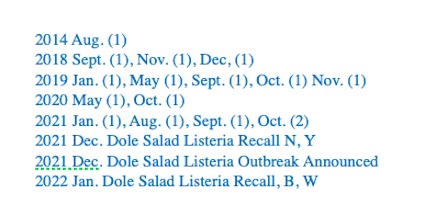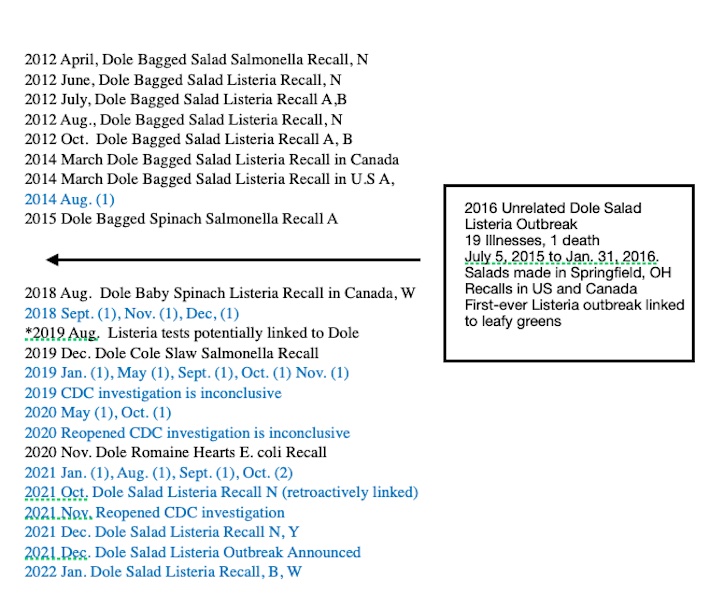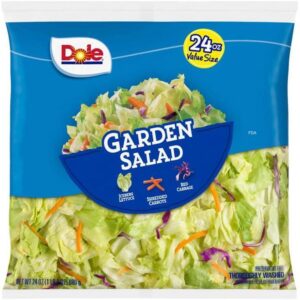On the day Patient 1 in the current Listeria outbreak linked to Dole packaged salads first experienced symptoms of illness, the iPhone 5 was the latest generation of Apple smartphones, Fifty Shades of Grey topped the New York Times Fiction Bestseller list, Missouri Governor Jay Nixon had just declared a state of emergency in Ferguson following the police shooting of unarmed teenager Michael Brown, and President Barack Obama was 12 days away from showing up to a press conference in a tan suit. It was August 16, 2014.
In the seven years since, 15 more patients have been identified using whole genome sequencing, a method that identifies the genetic “fingerprint” of bacteria cultured from sick people and contaminated food. Two of the patients, who lived in Michigan and Wisconsin, died.
The condensed outbreak timeline looks like this:

Back in 2014, there had never been a Listeria outbreak caused by leafy greens. And there is a four-year gap between the first and second illnesses confirmed in this outbreak. So, it wouldn’t be until 2018 when the second (and third and fourth ) cases were reported, that this could even be considered an outbreak. But right around the midpoint of that four-year gap, something unthinkable happened.
Plot Twist
In January 2016, leafy greens were identified as the source of a Listeria outbreak for the first time in history. And they were in packaged salads produced by Dole.
Incredibly, the illnesses were caused by a strain of Listeria with a different fingerprint than the one linked to the outbreak that began in 2014. Between July 2015 and January 2016, the strain, found in salads produced at Dole’s plant in Springfield, Ohio, sickened 33 people in the U.S. and Canada. Four of them died.
Months after the outbreak ended, the CDC revealed that the historic outbreak initially evaded detection because leafy greens, having never been linked to a Listeria outbreak, were not included on the food history questionnaires for case-patients. Weeks later, when patients were re-interviewed with open-ended questionnaires and shopper card records were provided where available, a common food was identified. All of the patients reported eating leafy greens in the month before they became ill. And some of them remembered brand names.
Meanwhile, the Ohio Department of Agriculture had collected and tested packages of Dole salad purchased at a grocery store as part of a routine sampling program. The results were positive for Listeria and the fingerprint was highly related to the clinical isolates. The salad was produced at Dole’s facility in Springfield.
On January 21, 2016, Dole announced a market withdrawal of salads produced at the plant and sold under 22 brand names and said it was halting production at the Springfield facility. The following day, the CDC announced the outbreak and on January 27, 2016, Dole issued a recall for all salads produced at the plant.
Based on information obtained through a Freedom of Information Act (FOIA) request, Food Poisoning Bulletin was first to report, in March 2016, that years before the outbreak was announced, Dole had found Listeria at the plant. The documents we obtained showed Dole had found Listeria in the plant in early 2014 and “infrequently” before that. In April 2016, the Justice Department opened an investigation into the outbreak.
To some, the revelation that there was Listeria at the plant didn’t come as a surprise considering Listeria had been turning up in finished products produced there for years. Between 2012 and 2016, Dole salads were recalled 10 times for Listeria or Salmonella in the U.S. and Canada. Five of the Listeria recalls were for salads produced at the Springfield plant.
Dole’s Springfield plant underwent a $9 million expansion in August 2014, courtesy of a 50 percent nine-year job creation tax credit. The expansion added three new packaging lines and one processing line producing spinach, spring mix, and baby lettuce packaged salads. Less than a year later, the first patients in the first-ever Listeria outbreak linked to leafy greens would fall ill after eating salads produced there.
 The Seven-Year Outbreak
The Seven-Year Outbreak
In the five years between the end of the 2016 outbreak and the announcement of the current outbreak and recall, there were five recalls for Dole leafy greens. And, potentially, an additional finding of Listeria with no recall.
In 2019, Consumer Reports tested a number of bulk and bagged salads. Six samples tested positive for Listeria. One of them, Triple-washed Nature’s Place Organic Spinach Spring Mix purchased at Hannaford, contained “a strain that was genetically linked to at least two cases of listeriosis that had been reported to the CDC.
Hannaford told Consumer Reports that the U.S. Food and Drug Administration (FDA) had not “found anything of concern in its inspection” of the plant where the salad was produced. Consumer Reports asked the FDA about its follow-up testing but did not receive a response before the time of publication on July 26, 2019.
Nature’s Place was a Hannaford store brand until 2019 when the name changed to Nature’s Promise. Dole currently produces Nature’s Promise salads for Hannaford, (they are included in the current recall) so it’s possible that they did so in 2019.
The five Dole packaged salad recalls between the two outbreaks were:
- August 9, 2018, Dole Baby Spinach Recalled in Canada (W)
- August 12, 2019, Dole Spinach Recalled for Possible Salmonella Contamination (W)
- December 4, 2019, President’s Choice Colorful Coleslaw Recalled for Possible Salmonella (B)
- November 23, 2020, Dole Organic Romaine Hearts Recalled for E. coli
- October 30, 2021, Dole Garden Classic Salads are Recalled for Possible Listeria
On December 22, 2021, the CDC announced two Listeria outbreaks linked to packaged salads. One, linked to salads produced by Fresh Express and sold under a variety of brand names, includes 10 illnesses and 1 fatality. The other, linked to packaged salads produced by Dole also sold under a variety of brand names, includes 16 illnesses and two fatalities. The 16 patients sickened in this outbreak, who range in age from 50 to 94 years, said they first became ill on dates ranging from August 16, 2014, to October 17, 2021.
This investigation is the CDC’s third attempt to solve this outbreak. The agency opened an investigation in 2019, when a total of eight people had been sickened, and again in 2020, when 11 people had been sickened. Each time, the investigations were inconclusive because the CDC wasn’t able to gather enough data to identify the source, the agency said.
On the date the outbreak was announced, Dole issued a recall for all Dole-branded and private label packaged salads processed at its production facilities in Bessemer City, NC, (lot codes beginning with and “N”) and its Yuma, AZ (lot codes beginning with a “Y”.) These salads, sold under the brand names Ahold, Dole, Kroger, Lidl, Little Salad Bar, Marketside, Naturally Better, Nature’s Promise, and Simply Nature, are packaged in bags or clamshells with “Best if Used By” dates between November 30, 2021, and January 8, 2022.
Dole issued the recall after Dole-branded Garden Salad produced in the Bessemer City facility and shredded iceberg lettuce produced in the Yuma, AZ facility tested positive for Listeria during random tests performed by state health officials in Georgia and Michigan. The strain found in these samples closely resembles the fingerprint cultured from 16 patients since 2014.
The CDC also stated that the Listeria strain associated with the salad recall on October 30, 2021, closely resembles the outbreak strain.
On January 7, 2022, Dole issued an expansion of the Listeria recall to include Dole-branded and private label packaged salads containing iceberg lettuce that were processed at its facilities in Soledad, CA, (lot codes beginning with a “B”) and Springfield (lot codes now beginning with a “W”, formerly with an “A”.) These salads have “Best if Used By” dates ranging between December 22, 2021, and January 9, 2022.
The recalled salads were sold by a variety of retailers nationwide including ALDI, Food Lion Giant, Hannaford, HEB, Kroger, Lidl, Loblaws (in Canada), Schnucks, Stop & Shop, Walmart, and Winn Dixie.
With all of this added context, the outbreak timeline looks more like this:

All of the recalled salads associated with this outbreak are past their “best by” dates, but symptoms of a Listeria infection can take as long as 70 days to develop. Among pregnant women, Listeria can cause miscarriage and stillbirth even if the mother experiences only mild symptoms.
Consumers who may have eaten these salads should monitor themselves for symptoms including high fever, severe headache, stiff neck, muscle stiffness, nausea, abdominal pain, and diarrhea. And see a doctor right away if they develop.

If you would like a free consultation with our Listeria lawyers, please call 1-888-377-8900, or send a text to 612-261-0856.
 The Seven-Year Outbreak
The Seven-Year Outbreak



